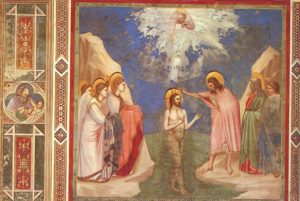Success or Significance?
 The Feast of the Baptism of the Lord marks the end of the Christmas season. Jesus’ baptism in the River Jordan signaled the formal beginning of His mission.
The Feast of the Baptism of the Lord marks the end of the Christmas season. Jesus’ baptism in the River Jordan signaled the formal beginning of His mission.
For today’s gospel scene we see the Holy Spirit descending upon Jesus in visible form. For the evangelist Luke, contrary to the three other evangelists, the baptism of Jesus is not important in itself, for he does not even describe it. He is more concerned with the coming of the Holy Spirit on Jesus. And after this initial scene, Luke will be at pains to mention the Holy Spirit as often as possible in connection with the ministry of Jesus. Seventeen times in his gospel he will mention the Holy Spirit in connection with Jesus. This is Luke’s way of telling us that Jesus was inspired (inspirited) in all his actions, empowered with his heavenly Father’s energy, enabled always to act as a beloved Son fulfilling a beloved Father’s wishes. And so, it is not a mere coincidence that, with the appearance of the Holy Spirit in this baptism scene, the son-ship of Jesus is emphasized, “You are my beloved Son.” Essentially, Jesus is a Son in his innermost being. And the Holy Spirit is the burning fire of love which unites him to his heavenly Father. For him to receive the spirit is to experience his son-ship at a new depth. It is the Holy Spirit that leads Jesus to accomplish his mission and made the Father say, “with you I am well pleased.”
I remember two years ago, I was on a vacation back home in the Philippines. After celebrating Mass at my home parish, one of my friends from high school came up to me for a small chat. He grew up in a poor family but worked his way to success with sheer talent and perseverance. He is a self-made man. He heads four businesses today that are making good money. “There’s nothing more I can ask for, Father. God is good. He has given me everything that I need and more,” he shared with me. But after a short pause he added, “except that I never knew if my father was proud of what I have accomplished.” His relationship with his father has been strained since after college. After that conversation, it hit me. The human heart is not made for success. It is made for significance.
Success is a matter of doing. Significance is a matter of being. And since we are not human doings but human beings, it makes sense that our heart yearns for something more than just success. It yearns for significance — the significance of meaningful relationships, mission, and yes, affirmation. Success does not always lead to significance, but significance always leads to a deep sense of success. Like the voice from the heavens that affirmed Jesus in His baptism, every human heart longs to hear the words, “in you I am well pleased.”
Isn’t it a wonder that, according to studies, almost eighty percent of substance abusers are successful people, and almost fifty-five percent of these successful people end up committing suicide? Without meaning to pass judgment, could it be that significance was missing on top of their successes?
The Baptism of the Lord reminds us not only about Jesus’ mission, but our very own mission to make a difference, to be a significance in the lives of others by showing them what really matters in our Christian lives. So that like Jesus, the Father would say to all of us, “In you I am well pleased.”
Fresco by Giotto di Bondone in the Scrovegni Chapel – 1303
Read More

















